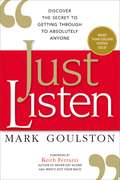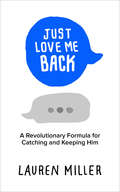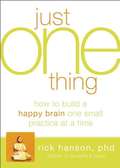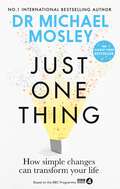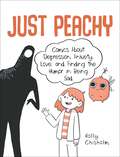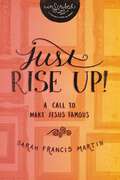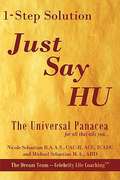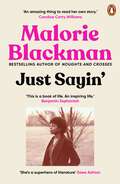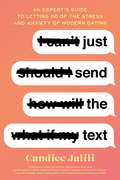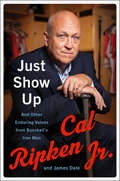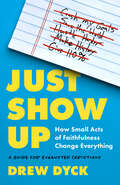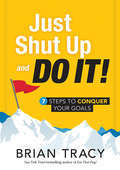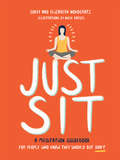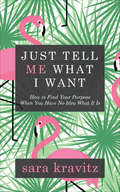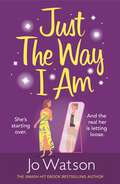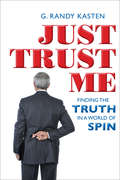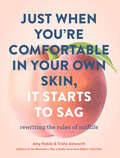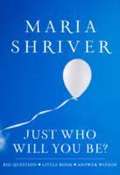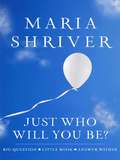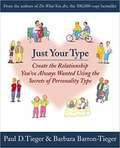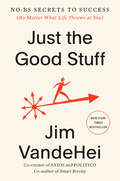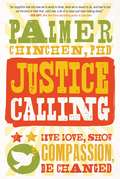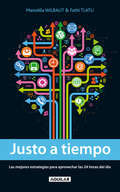- Table View
- List View
Just Listen: Discover the Secret to Getting Through to Absolutely Anyone
by Mark GoulstonGetting through to someone is a critical, fine art. Whether you are dealing with a harried colleague, a stressed-out client, or an insecure spouse, things will go from bad to worse if you can't break through emotional barricades and get your message thoroughly communicated and registered.Drawing on his experience as a psychiatrist, business consultant, and coach, author Mark Goulston combines his background with the latest scientific research to help you turn the &“impossible&” and &“unreachable&” people in their lives into allies, devoted customers, loyal colleagues, and lifetime friends.In Just Listen, Goulston provides simple yet powerful techniques you can use to really get through to people including how to:make a powerful and positive first impression;listen effectively;make even a total stranger (potential client) feel understood;talk an angry or aggressive person away from an instinctual, unproductive reaction and toward a more rational mindset;and achieve buy-in--the linchpin of all persuasion, negotiation, and sales.Whether they're coworkers, friends, strangers, or enemies, the first make-or-break step in persuading anyone to do anything is getting them to hear you out. The invaluable principles in Just Listen will get you through that first tough step with anyone.With this groundbreaking book, you will be able to master the fine but critical art of effective communication.
Just Little Things: A Celebration of Life's Simple Pleasures
by Nancy VuSeeing a baby yawnDrawing on a foggy windowFinding a curly fry mixed in with your regular friesThese and 247 other little things that make everyday life a joy are collected in this delightful, surprising, and heartfelt book. Based on the popular website, this book will strike a chord in anyone who is open to celebrating the little moments of greatness all around us.
Just Love Me Back: A Revolutionary Formula for Catching and Keeping Him
by Lauren MillerJust Love Me Back reveals how women&’s thoughts can impact the way they experience both relationships and life overall.Many women&’s relationships seem to nose-dive every time they think it's about to go to the next level. Maybe it&’s because they keep hoping he'll be all in this time. Then, once again, he's pulling away from any sort of commitment. They're constantly trying to balance getting close to him while simultaneously keeping a wall up to prepare themselves for what inevitably happens: when they want more, he wants less.Just Love Me Back is for women who find themselves in under-committed or un-committed relationships where they are left feeling unworthy, unwanted, and unloved. In Just Love Me Back, Lauren Miller, a life transformation scientist, offers women a revolutionary formula to getting the best relationship of their life. In this guide, readers learn what they may be doing wrong, why this is a pattern in their life, and how they can fix this problem so that they can have the relationship they&’ve always wanted.
Just One Thing: Developing a Buddha Brain One Simple Practice at a Time
by Rick Hanson[from the back cover] "big changes start with just one thing." You've heard the expression, "It's the little things that count." Research has shown that little daily practices can change the way your brain works, too. This book offers simple brain-training practices you can do every day to protect against stress, lift your mood, and find greater emotional resilience. Just One Thing is a treasure chest of over fifty practices created specifically to deepen your sense of well-being and unconditional happiness. Just one practice each day can help you: -- be good to yourself -- enjoy life as it is -- build on your strengths -- be more effective at home and work -- make peace with your emotions"
Just One Thing: How simple changes can transform your life
by Dr Michael Mosley'We all need a dose of Michael Mosley's Marvellous Medicine.' The TimesIf you were going to do just one thing to transform your health, what would it be?We all want quick and easy ways to improve our health, but when it comes to diet, fitness and wellbeing it can be hard to separate the facts from the fads. And harder still to find changes that fit easily into our daily lives.Based on the popular BBC podcast, Just One Thing, this book brings to life Dr Mosley's mission to find things you can introduce into your daily routine which will have a big impact on your mental and physical health.Did you know that eating chocolate can help your heart, that singing can give you a natural 'high' and that having more house plants can improve your mood and boost your productivity?Dr Michael Mosley unearths a range of Just One Things whose impacts are so surprising and intriguing you will be desperate to try them out. He chats to experts, road tests all his tips and enlists some special guests to help you find that one small thing that could really make a difference to how you feel.
Just One Thing: How simple changes can transform your life
by Dr Michael Mosley'We all need a dose of Michael Mosley's Marvellous Medicine.' The TimesIf you were going to do just one thing to transform your health, what would it be?We all want quick and easy ways to improve our health, but when it comes to diet, fitness and wellbeing it can be hard to separate the facts from the fads. And harder still to find changes that fit easily into our daily lives.Based on the popular BBC podcast, Just One Thing, this book brings to life Dr Mosley's mission to find things you can introduce into your daily routine which will have a big impact on your mental and physical health.Did you know that eating chocolate can help your heart, that singing can give you a natural 'high' and that having more house plants can improve your mood and boost your productivity?Dr Michael Mosley unearths a range of Just One Things whose impacts are so surprising and intriguing you will be desperate to try them out. He chats to experts, road tests all his tips and enlists some special guests to help you find that one small thing that could really make a difference to how you feel.
Just Peachy: Comics About Depression, Anxiety, Love, and Finding the Humor in Being Sad
by Holly Chisholm"In this autobiographical collection of thoughtful and poignant comic vignettes, Chisholm explores her experiences with depression, anxiety, and love ." —BooklistJust Peachy is a comic series that explores what the day-to-day is like with depression and/or anxiety. The all-too-real cartoon protagonist gives readers a character to empathize with, and helps explain some of the not often talked about consequences and symptoms of having depression. The comics also explore the themes of heartbreak, finding love, dealing with stress, and capturing the magical moments in life that keep us going.Through dark humor and cute illustrations, the subject matter becomes a bit more bearable, allowing for honest discussion about things like treatment and getting through anxiety attacks, and providing some comfort in times of struggle.For anyone affected by mental illness, Just Peachy shows that you are not alone. Simply put, this is an encouraging collection of comics about being just okay sometimes.&“So brave of Holly Chisholm to share her struggles with mental health issues through this creative medium. Just Peachy will inspire others to connect to, navigate through, and recover from their own day-to-day trials and tribulations of living with a mental illness. Well done!&” —Dr. Carlin Barnes and Dr. Marketa Wills, authors of Understanding Mental Illness and founders of Healthy Mind MDs
Just RISE UP!: A Call to Make Jesus Famous (InScribed Collection)
by Sarah Francis MartinSarahremembers the exact moment when the relationship between her faith and herentire life came into clear focus. Sitting in her favorite red chair with acomfy blanket and a cup of hot tea, she snuggled in with her Bible and a newbook. The book was huge, several hundred pages long, and yet it didn'tintimidate her. Written by the beloved Chuck Colson, How Now Shall We Live? focused the lens of Sarah's life and spelledout a segregation that she had unknowingly been living with--a segregation betweenher faith and the rest of her life. She hassince come to understand that The Lord designed each and every one of usuniquely and put a dream in our heart that is attached to His agenda for thisworld. Many of us have felt the stirringin our heart to make a difference with our life, yet we don't always know how.The key, she found, was to surrender to God's leading, seek him first, andallow him to do the big things He has planned with our life. In the end, God'sagenda and our dreams and passions will intersect around one very important phrase- a battle cry, if you will - "Make Jesus Famous!"Based onPsalm 145, this invigorating study motivates women to do life differently bymaking Jesus famous in all aspects of life. JustRISE UP! is a call to get off the couch of complacency, live a life ofpraise with a humble posture and Kingdom perspective, and step into a life of truepurpose. Featuresinclude: Verse by verse study of Psalm 145 Snippets of conversations with Sarah's readers Journaling prompts to help the reader dig deeper Conversation guide for small groups
Just Say HU
by Nicole Sebastian Michael SebastianHU...the Holy Grail of Life! This book contains a Lost Secret that has the power to transform an individual in an instant---two simple letters that when combined produce a powerful, yet harmonious vibration! ---HU is an Ancient yet forgotten Name of God found in most World Religions ---HU man Refers to the God Force within Man ---HU uses the Power of Quantum Physics ---HU is the One Place where Science and Spirituality Actually Meet ---HU to Avoid Adversity and Never Get Blind-Sided Again ---HU to Enhance Intuition and Confirm Your Gut Hunches ---HU before Bed and Say Good-bye to Insomnia and Nightmares ---HU to Unfold Spiritually and Tap into your Higher-Self ---HU to Overcome Addictions ---HU to Eliminate Stress and Anxiety
Just Sayin': My Life In Words
by Malorie BlackmanThe long-awaited autobiography of one of the world's greatest children's writers, and an empowering and inspiring account of a life in books.Malorie Blackman OBE is one of Britain's best loved and most widely-read writers. For over thirty years, her books have helped to shape British culture, and inspired generations of younger readers and writers. The Noughts and Crosses series, started in 2000, sparked a new and necessary conversation about race and identity in the UK, and are already undisputed classics of twenty-first-century children's literature.She is also a writer whose own life has been shaped by books, from her childhood in south London, the daughter of parents who moved to Britain from Barbados as part of the Windrush Generation, and who experienced a childhood that was both wonderful and marred by the everyday racism and bigotry of the era. She was told she could not apply to study her first love, literature, at university, in spite of her academic potential, but found a way to books and to a life in writing against a number of obstacles.This book is an account of that journey, from a childhood surrounded by words, to the 83 rejection letters she received in response to sending out her first project, to the children's laureateship. It explores the books who have made her who she is, and the background to some the most beloved and powerful children's stories of today. It is an illuminating, inspiring and empowering account of the power of words to change lives, and the extraordinary life story of one of the world's greatest writers.
Just Send the Text: An Expert's Guide to Letting Go of the Stress and Anxiety of Modern Dating
by Candice JaliliSay goodbye to the crippling stress and anxiety that come with dating in the 2020s with the dating advice all single people need.Have you ever convinced yourself that your crush is definitely not into you because they didn&’t watch your Instagram story? Have you ever pretended that you didn&’t want anything serious because you assumed your potential partner didn&’t want anything serious with you? Have you ever spent hours figuring out the &“perfect&” response to your date&’s text? Well Candice Jalili, senior sex and dating writer at Elite Daily, has done all of those things and she&’s here to tell you to stop. Stop giving in to your anxieties and insecurities. Stop replaying and rehashing every interaction. Stop thinking that you&’re not good enough exactly the way you are. Instead, take a deep breath and just send the text. In today&’s society, dating can be stressful. And Candice gets it: between social media, dating apps, the hookup culture, and just, you know, the patriarchy—there&’s no denying it; dating is hard. But there&’s no reason for dating to transform you into a ball of stress. Laid out in seven easy-to-follow steps, Just Send the Text will help you to let go of any dating-related stress and anxiety by accepting that, for the right person, just being yourself is more than enough. The book is filled with helpful tips including: -Don&’t be afraid to block someone on social media -Embrace dating apps as one of the many ways to meet a potential partner -Stop wasting your time trying to convince someone you&’re worthy of theirs -Being vulnerable might hurt in the short-term, but it will benefit you in the long-run Featuring first-person interviews with real women, visual aids, and compelling statistics, Just Send the Text will give you the courage to put yourself back out there, embrace dating once again, and find a real, authentic kind of love in today&’s world.
Just Show Up: And Other Enduring Values from Baseball's Iron Man
by James Dale Cal Ripken Jr.New York Times Bestseller!Iron Man Cal Ripken Jr.—the 19-time All-Star, World-Series winning legend, American League MVP, and record holder who played 2,632 consecutive games—outlines eight rules for the game of baseball and life, drawn from the lessons he has learned on and off the field.Cal Ripken Jr. is a baseball legend. But legends aren't born, they're made. For twenty-one seasons, Ripken took the field day in and day out, through cold, heat, rain, and sometimes snow, playing in more than 3,000 games for the Baltimore Orioles. In 1983, the revered shortstop helped lead his team to victory in the World Series. On September 6, 1995, Ripken did the seemingly impossible, he surpassed Lou Gehrig's unbreakable fifty-six-year-old Iron Man record, setting a new mark of 2,131 consecutive games—then played another 501 consecutive games. Throughout his career, Ripken was admired for his consistency, hard work, and loyalty. There were successes and failures, but above all was an old-fashioned sense of doing what's right, every single day. Since retiring in 2001, Ripken has enjoyed a successful career as a baseball analyst, entrepreneur, and author. Now, in Just Show Up, he reflects on his life and career to offer lessons for the next generation and those to come. Ripken speaks eloquently about the timeless values he has lived by: Life is a streak,play the long game; Success and money are not the same; Play fair,win fair. And he shares stories of his legendary father, Baltimore Oriole coach and manager Cal Ripken Sr., what it took to keep the streak alive, and what it meant to bring the World Series to Baltimore.Cal Ripken's message is simple yet poignant; wisdom essential to anyone trying to forge a successful life in times that are often chaotic. Blending insights from sports, business, and a life well-lived, Just Show Up is the story of an American legend and the principles he has lived by—standards our time needs.
Just Show Up: How Small Acts of Faithfulness Change Everything (A Guide for Exhausted Christians)
by Drew DyckIf someone puts one more thing on my shoulders, I might collapse.Bestselling self-help book titles tell you that you&’re brilliant, awesome, powerful—usually with an expletive thrown in, just to pound home the point. Do these affirmations feel accurate? Instead of blasting through projects and conquering the world, most of us feel like we&’re crawling uphill.But Christians are still called to live a life that glorifies God and blesses others. How do we do that when we&’re stretched to capacity? Just Show Up answers that question with a liberating message: God doesn&’t expect you to do everything. And He certainly doesn&’t expect you to do it all overnight. Simply showing up is often the most important thing.This book looks at present-day examples and also stories from Scripture of imperfect people used by God. Moses, by his own admission, wasn&’t very eloquent, but he showed up and God used him to liberate and lead His people. We name churches and children after the disciples. But originally, they were just a bunch of uneducated nobodies with one thing in common: when Jesus said, &“Follow me,&” they showed up.With humor and candor, Dyck reflects on his own faltering progress while recounting inspiring stories of how God rewards the persistent presence of ordinary people. Just Show Up challenges readers to show up for God, family, community, and themselves.We tend to think it&’s the big, bold moments that matter. In reality, it&’s the steady accumulation of small acts of obedience to God that add up to a life of meaning and impact. –Dyck
Just Shut Up and Do It: 7 Steps to Conquer Your Goals
by Brian TracyWhat makes some people successful in life? In Just Shut Up and Do It, bestselling author and success expert Brian Tracy shares a simple, practical, proven seven-part method that will help you accomplish more in the next few months and years than most people accomplish in a lifetime. In its simplest terms, your ability to get started and keep going until you complete those things that are most important to you and to your company is the key to winning, to happiness, to a great reputation, and to success in life. There are no limits to what you can achieve.
Just Sit: A Meditation Guidebook for People Who Know They Should But Don't
by Sukey Novogratz Elizabeth NovogratzFrom the cofounders of The Well Daily, an illustrated, informative, and easy-to-use meditation guidebook—including an eight-week plan for busy novices.We’ve all heard the reports about meditation: that it helps us relieve stress and anxiety, improve our moods, lose weight, and sleep better. We know that it can make us healthier, nicer, a kinder parent, a better coworker, a more thoughtful spouse. But there’s a catch—you actually have to do it.Written for the many, many people whose schedule or skepticism has kept them from trying meditation, Just Sit is an approachable and visually engaging beginner's guide. Assuaging fears, answering questions, and providing real-world information to demystify the process, Sukey and Elizabeth Novogratz provide a hands-on look at what meditation really is, what is does, and how to do it. The authors make clear that meditation doesn't have to be complicated or follow a specific protocol. The most important part, to “just sit,” can lead to a lifelong practice, tailored to anyone's lifestyle.A perfect blend of information and instruction, Just Sit covers everything you wanted to know but were too afraid to ask. Sukey and Elizabeth address meditation myths and realities, offer advice on how to combat awkwardness, extoll the physical and emotional benefits of meditation, show readers how to find those precious minutes to meditate every day, and more. They also include an eight-week plan to get help readers kick start—and stay with—their own daily practice.Time to ditch the excuses. With this warm, encouraging, sassy guide, everyone will want to show up—and sit down—every day.
Just Tell Me What I Want: How to Find Your Purpose When You Have No Idea What It Is
by Sara KravitzIf you desperately want to change your life, but have no idea what to change it to, then let this guide help you pinpoint your true desires. How do you figure out what you want? Just Tell Me What I Want is for anyone who has ever been told to &“follow their bliss&” and then immediately wanted to punch that person in the face. Maybe you feel like you should have things figured out by now. Maybe you think things should be better, but you don&’t know how to get started. Maybe you would love to work really hard toward something, but aren&’t totally sure what that something is. What if there was actually a way to get you pointed in the right direction? And what if it didn&’t involve someone telling you to &“follow your bliss?&” Change can be scary. Change can feel risky. But taking a chance is always worth it. Just Tell Me What I Want helps readers take the right steps for them to figure out what they want.
Just The Way I Am: Hilarious and heartfelt, nothing makes you laugh like a Jo Watson rom-com! (Starting Over)
by Jo WatsonShe's starting over. And the real her is letting loose.From the author of the 100,000 copy-selling rom-com, Love to Hate You! No one makes you laugh like Jo Watson!If you love by Mhairi McFarlane, Sophie Ranald, Sophie Kinsella and Paige Toon, you'll LOVE Jo Watson - readers are raving about her glorious rom-coms!Readers are already WOWED by Just The Way I Am!'Without a doubt Jo Watson's best book so far, and I've almost read all of them''I have read ALL of Jo Watson's previous books and this is quite possibly my new favourite''An intricate and delicate romance with themes of loss, love, self discovery and a little bit of fate thrown in too!''A laugh-a-minute journey of self-discovery that was far too easy to read in one sitting''I loved, loved, loved this story!! I feel as though there aren't enough stars to give it''This was my first Jo Watson book and it will not be the last I have found my new fave author. 5 out of 5 stars from me, loved it'Has Fate given her a second chance?'Zoe' is having a very bad day. As if getting trapped in a faulty elevator wasn't bad enough, losing her memory has made it much worse. If there's one piece of luck, it's that the paramedic on the scene, Noah, is both kind and a handsome distraction... Now a completely blank canvas, with the help of Noah, 'Zoe' is excited to fill her world with colour, creativity and sweet and spicy food. She just knows from the tips of her toes, right to her fleek brows, that these things were all part of her make-up. But when her identity is traced, the life 'Zoe' was living before the accident bears no resemblance to that of the person she's convinced she is. What happened to make her world so narrow and colourless? And now she has the chance to start over, is it time to let the real Zoe out?It all started with a faulty elevator - don't miss Becca story in You, Me, Forever and Frankie's in Truly, Madly, Like Me!Readers are raving about Jo Watson's glorious rom-coms!'A hilarious, laugh-out-loud romance that is a breath of fresh air' 5* reader review'A masterclass in character development... This is truly a novel for the times we live in. I would highly recommend' 5* reader review'Another absolutely gorgeous read by one of my favourite authors...completely impossible to put down' 5* reader review'I loved this book. It was so funny and I really wish a movie could be made of it' 5* reader reviewLove funny, romantic stories? You don't want to miss Jo Watson:'The perfect choice for fans of romantic comedies' Gina's Bookshelf'It was amazing, it was hilarious' Rachel's Random Reads'A brilliant read from beginning to end' Hopeless Romantics'Sitting here open mouthed in disbelief at just how wonderful this book is' Rachel's Random Reads'A stunning heart-warming read' Donna's Book Blog
Just Trust Me
by G. Randy KastenSUVs are the safest vehicle because they're so large-right? Wrong! That's the advertising pitch, but in 2000, they had the highest rollover rate (36%) of any vehicle type involved in fatal accidents. Yet two years later their safety myth was still so strong that one of four vehicles sold in the U. S. was an SUV. The world of spin we live in is full of such potentially hazardous illusions. We need to know if particular foods can hurt us with Salmonella or cholesterol, whether our government is truthful in its reasons for waging war, what problems a political candidate may cause or resolve if elected, and whether the items we purchase are durable or junk. But gaining those insights can be challenging when so many of the illusions surrounding us are deliberately created. As a civil-litigation attorney for over twenty-five years, Randy Kasten has heard thousands of lies. He has witnessed that those who dispense the information we need to make decisions-advertisers, salespeople, politicians, and the media-often have a vested interest in manipulating us. Truth's biggest enemies are the people whose job it is to sell us incomplete versions of the facts and our willingness to believe what we want to believe. Often, we believe what we believe because it is the only story available.To help us see through deceptions of all types, Kasten discusses eight kinds of lies and what we can do about them, as well as methods for discerning the truth gleaned from his practice of law. Other topics include advertising magic, thirty-six places where the truth hides, lessons from science, the media and misinformation, and how we fool ourselves. Altogether, he provides a unique tool for enabling us to make decisions that will lead to more prosperity, better health, greater intimacy, and a life based on lasting values.
Just When You're Comfortable in Your Own Skin, It Starts to Sag: Rewriting the Rules to Midlife
by Amy Nobile Trisha AshworthThe irrepressible authors of I’d Trade My Husband for a Housekeeper are back to dish about the trials—and triumphs—of midlife.Delivered in the voice of a close friend, this clever and insightful guide from Trisha Ashworth and Amy Nobile takes women through the new and sometimes challenging phase of middle age. Whether married, single, widowed, divorced, with children or without, at some point women inevitably ask the question, “What’s next?” Here, they will find a road map for how to thrive in this new phase of life.Trisha and Amy discuss redefining what beauty means after age forty, caring for aging parents, navigating relationships and dating, and discovering new career paths. With helpful quizzes, friendly advice, and inspiring quotes from women who have been there, this smart and engaging book gives readers the tools to turn a midlife crisis into a midlife opportunity.
Just Who Will You Be? Big Question, Little Book, Answer Within
by Maria Shriver"I've learned that asking ourselves not just what we want to be, but who we want to be is important at every stage of our lives, not just when we're starting out in the world. That's because in a way, we're starting out fresh in the world every single day." Just Who Will You Be? is a candid, heartfelt, and inspirational book for seekers of all ages. Inspired by a speech she gave, Maria Shriver's message is that what you do in your life isn't what matters. It's who you are. It's an important lesson that will appeal to anyone of any age looking for a life of meaning. In her own life, Shriver always walked straight down her own distinctive path, achieving her childhood goal of becoming "award-winning network newswoman Maria Shriver". But when her husband was elected California's Governor and she suddenly had to leave her job at NBC News, Maria was thrown for a loop. Right about then, her nephew asked her to speak at his high school graduation. She resisted, wondering how she could possibly give advice to kids, when she was feeling so lost herself. But in the end she relented and decided to dig down and dig deep, and the result is this little jewel. Just Who Will You Be? reminds us that the answer to many of life's question lie within -- and that we're all works in progress. That means it's never too late to become the person you want to be. Now the question for you is this: Just who will you be?.
Just Who Will You Be?: Big Question. Little Book. Answer Within.
by Maria Shriver"I've learned that asking ourselves not just what we want to be, but who we want to be is important at every stage of our lives, not just when we're starting out in the world. That's because in a way, we're starting out fresh in the world every single day." Just Who Will You Be is a candid, heartfelt, and inspirational book for seekers of all ages. Inspired by a speech she gave, Maria Shriver's message is that what you do in your life isn't what matters. It's who you are. It's an important lesson that will appeal to anyone of any age looking for a life of meaning. In her own life, Shriver always walked straight down her own distinctive path, achieving her childhood goal of becoming "award-winning network newswoman Maria Shriver". But when her husband was elected California's Governor and she suddenly had to leave her job at NBC News, Maria was thrown for a loop. Right about then, her nephew asked her to speak at his high school graduation. She resisted, wondering how she could possibly give advice to kids, when she was feeling so lost herself. But in the end she relented and decided to dig down and dig deep, and the result is this little jewel. Just Who Will You Be reminds us that the answer to many of life's question lie within--and that we're all works in progress. That means it's never too late to become the person you want to be. Now the question for you is this: Just who will you be?
Just Your Type: Create the Relationship You've Always Wanted Using the Secrets of Personality Type
by Barbara Barron-Tieger Paul D. TiegerMen and women aren't from different planets; they possess instead different personality types that drive behavior. Learn to accept, appreciate, and understand these differences for a better, happier relationship with a partner. Line drawings.
Just the Good Stuff: No-BS Secrets to Success (No Matter What Life Throws at You)
by Jim VandeHeiA deeply personal, authentic, and clear-eyed guide to navigating today&’s complex world and building a meaningful, successful career and life—no matter where you start out—from the bestselling author and cofounder of Axios and Politico.Jim VandeHei&’s high school guidance counselor laid it out clearly: VandeHei wasn&’t cut out for college. In 1990, you could find him proving the counselor&’s case emphatically, preferring beer to books and delivering pizzas to mapping out career plans. He attended a two-year school before smuggling himself into the University of Wisconsin-Oshkosh, where after a year he had racked up a 1.4 GPA and was on the verge of getting the boot.Everything changed when he discovered his passions: politics and journalism. VandeHei went on to cover the presidency and cofound two of the biggest modern news outlets, Politico and Axios, the media companies that upended and revolutionized journalism. He took notes every step of the way. And in Just the Good Stuff, his debut as a solo author, VandeHei writes the book he wishes someone had handed him when he was floundering—not a compendium of conventional wisdom but a real-world guide to achieving that other &“good stuff,&” health, wealth, happiness, all the blessings and exquisite pleasures we loosely group under that oft used but still under-appreciated rubric—success. Delivered in his hallmark no-word-wasted style, VandeHei offers essential, no-BS guidance on how to handle everything from finding a calling to building a team to navigating the realities of a changing workplace, showing us that no matter how inauspicious our beginnings, no matter how far down the ladder we begin, no matter what kind of challenges we face, a fulfilling life is within our reach.
Justice Calling: Live Love, Show Compassion, Be Changed
by Palmer ChinchenFrom the author of Barefoot Tribe, whose "manifesto offers hope and inspiration for people of all faiths" (Booklist), comes a spiritually exhilarating guide toward living a life full of purpose, authenticity, and justice.Do you feel stuck in your faith? Are you searching for purpose? Do you desire a more authentic life? If your faith experience has been in the Western church, you have probably missed an essential part of spiritual growth without even knowing it. For decades, the church has been focused on personal piety instead of the needs of the world around it. But Christians have not been entrusted with the story of the Gospel to simply start building campaigns and run programs, rather we are to bring the world the message of hope and love. And to meet the needs of those we come in contact with. In Justice Calling, Palmer Chinchen offers a call to a fuller expression of following Christ. He says our faith must be a faith of doing, not just hearing. Our gaze must shift from ourselves and our small enclave like-minded individuals to the world filled with opportunities to bring justice and mercy. We must go. To the poor, the enslaved, the lost, and the lonely. There we will find fulfillment as we live out our calling. Are you ready to join the movement toward living with a purpose, loving authentically, and engaging in the cause of justice around the globe? In Justice Calling, you will find that not only will you bring change to the lives of those you seek to serve but in so serving you will be indelibly changed as well. Live, Love, Show Compassion, Be Changed--justice is calling...
Justo a tiempo
by Willbaut ManoëllaCon Justo a tiempo aprenderás, entre muchas cosas valiosas, a no dejar para otra ocasión tus tareas pendientes: ¡Empieza por no dejar para después la lectura de este libro que, sin duda, transformará tu vida! De Manöella Wilbaut y Fathi Tlatli, especialistas en temas de negocios. La planeación y la buena organización son cruciales para ser exitosos y todos podemos tener las herramientas necesarias para aprender a manejar nuestro tiempo, para mejorar nuestra eficiencia, enriquecer nuestra vida y sacarle provecho a nuestro tiempo libre. ¿Por qué nos cuesta tanto trabajo aprovechar el tiempo? ¿Qué razones nos llevan a posponer nuestras actividades? ¿Es posible recuperar el tiempo? Pero, ¿qué es el tiempo? ¿Todos percibimos su paso de la misma manera? Manöella Wilbaut y Fathi Tlatli responden de manera audaz y divertida estas preguntas y proponen un sistema personalizado del manejo del tiempo. Los autores te llevana la conclusión de que puedes logar una vida más feliz y exitosa si administras tu tiempo de manera eficiente; afirman que sólo apreciamos el tiempo cuando no lo tenemos, por lo que una planeación detallada y una buena organización de nuestras actividades resulta fundamental para ser productivos y tener las herramientas necesarias para manejar con excelencia nuestro tiempo. Sin importar si eres empresario de primer nivel, ama de casa súper ocupada o estudiante activo que trabaja, en estas páginas aprenderás a organizarte y a exprimir cada segundo, a equilibrar tu vida y distribuir de manera correcta tus actividades; valorarás tu tiempo y aumentarás tu eficiencia, le sacarás provecho a tus ratos libres y, además, con el manejo audaz de tus horas lograrás el equilibrio perfecto entre tu vida personal y tu desarrollo profesional.
